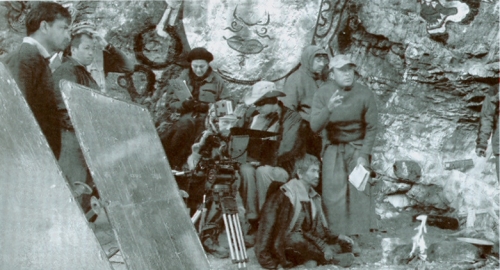
In the Buddhist kingdom of Bhutan, nestled deep in the Himalayas, two men seek to escape their mundane lives. One, a Western-educated university graduate, decides that he will be better off plucking grapes in the U.S. than working as a commissioned official in the local government. The other, a restless farm youth studying magic, cannot bear the thought of a life consigned to his village and so slips into a dreamworld of seduction and fantasy.
The two men embark on parallel, if separate, journeys. Their yearning is a common one—for a better and different life—and their efforts betray a similarly common assumption: that the grass is surely greener on the other side. Their story would most likely resonate with any audience, but for Bhutanese the tale is particularly powerful. It bears witness to the rapid transformation of contemporary Bhutanese society, and it evokes the uncertainties and anxieties of life lived at the crossroads of cultural change.
Travelers and Magicians is the first feature-length film recorded in Dzongkha, the Bhutanese national language. Shot in the rustic setting of rural Bhutan, against the raw backdrop of richly forested mountains, lush valleys, and white river rapids, the film is the creative vision of director and spiritual teacher Dzongsar Khyentse Rinpoche.
While red-robed monks are a common sight in this far-flung bastion of Vajrayana Buddhism, it is still quite unusual to see an enrobed figure in a peaked cap directing a large film crew in Bhutan’s remote countryside and leading an entourage of cars, buses, and trucks carrying five tons of assorted film equipment over the meandering mountain highways. Film sets, however, are nothing new to the forty-one-year-old rinpoche. He served as a consultant on Bernardo Bertolucci’s 1992 film, Little Buddha, and directed the quietly successful Tibetan film The Cup in 1999.
Some might find it surprising that Khyentse Rinpoche, the reincarnation of Jamyang Khyentse Wangpo (1820-1892) and the spiritual director of two meditation centers and two Buddhist philosophy colleges in East Bhutan and India, is spending so much time behind a camera. He, for one, sees no conflict. In his view, the screen offers a powerful medium for the Buddha’s teachings. “The beauty of Buddhism is that we can use any skillful means to teach,” says Rinpoche. “Buddhism is one philosophy that really has this wealth of openness. I think film is today’s medium for reaching people, and we should take advantage of that.”
Rinpoche is also acutely aware that this is an entirely foreign concept to many Bhutanese, including some of the clergy. “I’d like to think that this will help break taboos,” he adds. “People expect me to be a rinpoche by putting me up on a seat, but we can break out of that image. It is time that we practice and live according to our beliefs. Film is about culture, and culture is changing all the time. What we are doing now might have been unheard of fifty years ago, but in fifty years this will be nothing unusual.”
Asked if he considers himself a rebel in the Buddhist world, Rinpoche says that, on the contrary, he takes a conservative approach to dharma and practice. He also sees a direct parallel between film and Buddhist art: “I could say that film is a modern-day thangka, with movement and sound.”
The shooting of Travelers and Magicians, at a cost of U.S. $1.8 million, has already had an impact on the fledgling Bhutanese film industry, where an average film is budgeted at about $20,000. Local producers, directors, cameramen, soundmen, and actors received valuable exposure as they worked alongside Hollywood veterans, including professionals from Australia, the U.K., and India.
Despite the demands of managing such a large production, Rinpoche still found time to hold both formal and informal teachings throughout the three-month shooting period, offering blessings and giving dharma talks to members of the cast and crew as well as to farmers in the location sites. An entire village in central Bhutan took part as extras in one scene, and the people later asked Rinpoche to subjugate a demon in the area. A large rock face near the village now carries a painting of a chorten (a reliquary shrine) and the following inscription:
May all sentient beings be free from
wanting to be praised
Not wanting to be criticized
Wanting to be happy
Not wanting to be unhappy
Wanting to gain
Not wanting to lose
Wanting to be famous
Not wanting to be unknown
Thus prayed on the occasion of
Filming in Bhutan, November 2002
Khyentse Rinpoche is currently in the process of editing Travelers and Magicians. Its international release is scheduled for later this summer.
Thank you for subscribing to Tricycle! As a nonprofit, we depend on readers like you to keep Buddhist teachings and practices widely available.